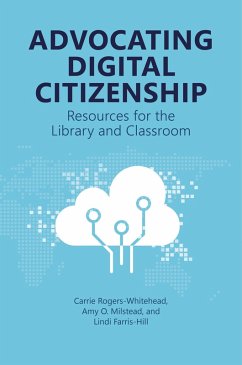In this down-to-earth guide, educators will learn successful strategies for embedding digital citizenship into their library and school instruction.
Digital citizenship, the ethical and responsible use of technology, is more important than ever for 21st-century learners and families-all of whom are spending increasingly long hours behind screens. Because libraries and schools are often the mediators between technology and individuals, educators must know what digital citizenship is and how they can understand, program, and promote it.
In Advocating Digital Citizenship, readers will learn from a public librarian and two current school librarians a wealth of real-life, easy-to-follow strategies to make libraries healthy, equitable, and safe digital spaces for everyone. Covering complex but important topics like digital law, digital etiquette, and media literacy, the authors help librarians and teachers establish a curriculum, write programming, and collaborate with colleagues to achieve buy-in at all levels.
Educators will benefit from a chapter dedicated to lesson plans, and a practical appendix includes digital citizenship program outlines, policy and procedure documents, and conversation prompts around technology to share with families. In our current climate, which requires so many new digital experiences for people of all ages, digital citizenship instruction is timely and essential.
Digital citizenship, the ethical and responsible use of technology, is more important than ever for 21st-century learners and families-all of whom are spending increasingly long hours behind screens. Because libraries and schools are often the mediators between technology and individuals, educators must know what digital citizenship is and how they can understand, program, and promote it.
In Advocating Digital Citizenship, readers will learn from a public librarian and two current school librarians a wealth of real-life, easy-to-follow strategies to make libraries healthy, equitable, and safe digital spaces for everyone. Covering complex but important topics like digital law, digital etiquette, and media literacy, the authors help librarians and teachers establish a curriculum, write programming, and collaborate with colleagues to achieve buy-in at all levels.
Educators will benefit from a chapter dedicated to lesson plans, and a practical appendix includes digital citizenship program outlines, policy and procedure documents, and conversation prompts around technology to share with families. In our current climate, which requires so many new digital experiences for people of all ages, digital citizenship instruction is timely and essential.


